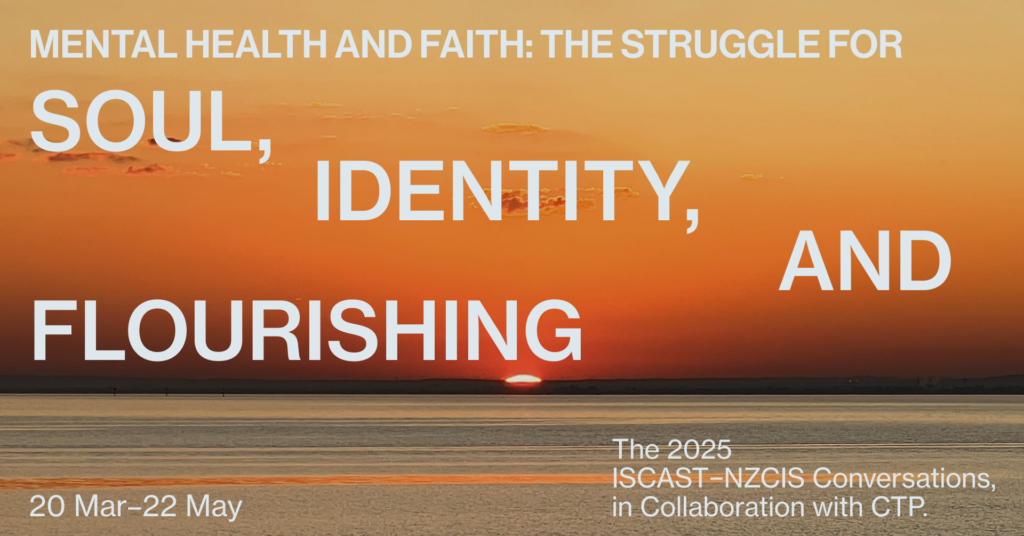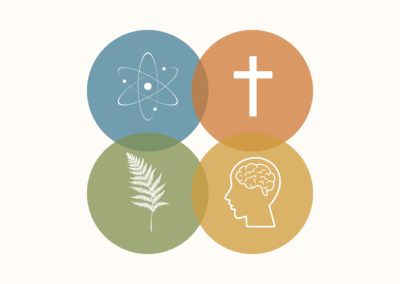
ISCAST–NZCIS Conversations 2025, in collaboration with the Centre for Theology and Psychology at Melbourne School of Theology.
This series of online conversations delves into the growing mental health crisis, where mental illness is often a private battle that affects the deepest parts of the self and compromises one’s sense of identity. Compounded by shame, stigma, and the difficulty of accessing meaningful help, mental health challenges continue to rise.
With mental illness projected to become the largest global healthcare burden by 2030, how might Christians think and respond, both clinically and theologically? Despite advances in science and technology, why are true cures elusive? Are we asking the wrong questions? Is the modern environment—characterised by technology, isolation, abstract thinking, and alienation from nature—contributing to this hidden suffering?
Furthermore, what does the Christian faith have to offer those struggling with mental illness? Can we redefine wellness and well-being to encompass both the “long dark night of the soul” and the pursuit of joy and flourishing?
Speakers & Topics
Dr Brett Mann | 10th April |
Mental Health, Faith and Medical Practice
In this talk Brett will discuss how the growing mental health crisis presents in general practice. He believes Christian perspectives provide deep insights into the sociocultural aetiologies of western society’s complex mental health challenges and indicate ways to alleviate it in addition to the usual more narrowly focussed approaches of counselling and medication.
Speaker Bio:
I recently finished general practice after 39 yrs at Ilam Medical Centre in Christchurch. I have been a medical educator for seventeen years in the RNZCGP registrar training programme and I am a visiting lecturer at Otago Medical School. I have informal psychotherapy training and have provided over one thousand hours of one hour counselling sessions in my practice
with supervision. I have provided over nine hundred hours of group supervision, focussing primarily on the doctor-patient relationship.
I had a central role in redesigning the RNZCGP national communication skills training programme and have provided many seminars around New Zealand for medical educators, general practitioners and registrars on somatisation (the expression in physical symptoms of psychological distress) and on advanced communication skills.
I have a high view of Scripture and a Christocentric, holistic perspective of the human person in community. In my medical career, I have pursued an integrated view of the human person including mind, body, culture, nature and spirit, worked out in relationship-centred care. Theologically, I have been endeavouring to integrate Evangelical, Charismatic, Catholic and Orthodox theologies.
Dr Christa McKirland | 1st May |
Authority and Power Structures in the Church Which Undermine Individual Agency
The psychological need for agency is well-established in major theories of motivation (such as Self-Determination Theory). However, when it comes to our experiences in churches, agency is easily undermined through authority structures that enable overreach by those with power. In this talk, I will discuss some of my findings from a quantitative survey of NZ Baptists as it relates to authority, power, and agency. I will highlight both the challenges to fostering agency as well as some possible ways forward.
Speaker Bio:
Christa L. McKirland (PhD, University of St. Andrews) is Dean of Faculty and a Lecturer in systematic theology at Carey Baptist College in Auckland, New Zealand. She is the founder and executive director of Logia International.
She has always loved asking questions, and my research often revolves around inquiries such as: What does it mean to be human? How does Jesus inform our understanding of humanness? What is the role of the Spirit in our maturity as the family of God? What understandings of power and authority facilitate our intended flourishing? How do we foster agency-supportive church structures for the benefit of all?
These questions arise from her understanding of God as one who desires a flourishing creation and calls humanity to participate in sharing power toward this end.
Dr Ruth McConnell | 15th May
Responding to the Growing Mental Health Crisis as a Christian: Clinical and Theological Perspectives
This talk will address the question, how might Christians think and respond, both clinically and theologically to the growing mental health crisis? Speaking from my 32 years of clinical experience in Counselling Psychology as well as from the foundation of my Christian faith, I am more hopeful about the field of psychological healing than I have ever been, despite the dire statistics. The field of mental health has taken some very positive turns in addressing the pervasive mental health crisis. We had the decade of the brain in the 1990s leading to an explosion of research in neuroscience. The Positive Psychology movement challenged the pathologizing medicalised approach, placing emphasis on resilience and human flourishing. Attachment theory has emphasised the healing power of relational connection ushering in a relational turn in psychology. The rise of indigenous and decolonising practices in psychology challenges the hyper-individualised notion of the self as well as the dualism so prevalent in the West. They have also ushered in the legitimate space for spirituality to be honoured in psychological healing. All of these developments I feel have more alignment with my Trinitarian theological anthropology, seeing humans as Imago Dei, made in the image of God as a relational community of mutual, reciprocal, unconditional love. The more recent development in trauma-informed approaches has also given me hope. Bessel Van der Kolk has hailed Dr Richard Schwartz’ Internal Family systems (IFS) as an approach that “changes the way therapy is practiced.’ In this talk I will give a very brief overview of Internal Family Systems (IFS) approach to healing and its alignment with Christianity.
Speaker Bio:
Dr Ruth Lawson-McConnell is a counsellor, supervisor and trainer in private practice in Auckland. She did her MA (Psychology and Social Anthropology) and her PhD (Counselling Psychology) in Aberdeen, Scotland. She was born and raised in the Amazon Region of Brazil where her Scottish parents were missionaries for 36 years. She studied theology at Regent College in Vancouver BC where she lived before coming to New Zealand for the role of Senior Lecturer in Counselling at Laidlaw College. She is now in private practice, offering counselling, training and specialist supervision on attachment issues, anxiety, depression and trauma and parent consulting on children’s emotional and behavioural issues (www.ruthmcconnell.com).
About the ISCAST–NZCIS Conversations
Since 2020, ISCAST and New Zealand Christians in Science have run the Conversations series, with an aim to promote a dialogue between the sciences and the Christian faith. Experts are invited to speak on their topic, which is then followed by a Q&A and discussion.
“The result of the Conversations for me is that theology and science together now truly inform my worship—no doubts, no niggles, no uncertainty.”
“New subjects and old ones, presented brilliantly.”
Please Note
ISCAST’s aim is to generate a constructive conversation and, while ISCAST and NZCIS are committed to orthodox Christian faith and mainstream science, the Conversations speakers may come from a range of positions and do not represent either ISCAST or NZCIS.



